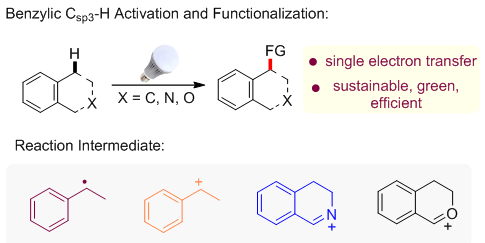| [1] (a) Vanjari, R.; Singh, K. N. Chem. Soc. Rev. 2015, 44, 8062;
(b) Zhang, J.; Lu, Q.-Q.; Liu, C.; Lei, A.-W. Chin. J. Org. Chem. 2015, 35(4), 743. (张剑, 陆庆全, 刘超, 雷爱文, 有机化学, 2015, 35(4), 743.);
(c) Huang, Z.; Tang, S.; Lei, A. Sci. Bull. 2015, 60, 1391.
[2] Prier, C. K.; Rankic, D. A.; MacMillan, D. W. Chem. Rev. 2013, 113, 5322.
[3] Koike, T.; Akita, M. Inorg. Chem. Front. 2014, 1, 562.
[4] Ravelli, D.; Protti, S.; Fagnoni, M. Chem. Rev. 2016, 116, 9850.
[5] (a) Xi, Y.; Yi, H.; Lei, A.-W. Org. Biomol. Chem. 2013, 11, 2387;
(b) Zeng, T.-T.; Xuan, J.; Chen, J.-R.; Lu, L.-Q.; Xiao, W.-J. Imaging Science and Photochemistry 2014, 32, 415. (曾婷婷, 宣俊, 陈加荣, 陆良秋, 肖文精, 影像科学与光化学, 2014, 32, 415.)
[6] Hopkinson, M. N.; Sahoo, B.; Li, J.-L.; Glorius, F. Chem. Eur. J. 2014, 20, 3874.
[7] Nicewicz, D. A.; Nguyen, T. M. ACS Catal. 2014, 4, 355.
[8] Hari, D. P.; Konig, B. Angew. Chem. Int. Ed. 2013, 52, 4734.
[9] Yoon, T. P.; Ischay, M. A.; Du, J. Nat. Chem. 2010, 2, 527.
[10] Xuan, J.; Xiao, W.-J. Angew. Chem. Int. Ed. 2012, 51, 6828.
[11] Xia, J.-B.; Zhu, C.; Chen, C. J. Am. Chem. Soc. 2013, 135, 17494.
[12] Xia, J.-B.; Zhu, C.; Chen, C. Chem. Commun. 2014, 50, 11701.
[13] Qvortrup, K.; Rankic, D. A.; MacMillan, D. W. C. J. Am. Chem. Soc. 2014, 136, 626.
[14] Hager, D.; MacMillan, D. W. C. J. Am. Chem. Soc. 2014, 136, 16986.
[15] Rabet, P. T. G.; Fumagalli, G.; Boyd, S.; Greaney, M. F. Org. Lett. 2016, 18, 1646.
[16] Hou, T.-Y.; Lu, P.; Li, P.-X. Tetrahedron Lett. 2016, 57, 2273.
[17] Lu, P.; Hou, T.-Y.; Gu, X.-Y.; Li, P.-X. Org. Lett. 2015, 17, 1954.
[18] Pandey, G.; Laha, R.; Singh, D. J. Org. Chem. 2016, 81, 7161.
[19] Zou, Y.-Q.; Lu, L.-Q.; Fu, L.; Chang, N.-J.; Rong, J.; Chen, J.-R.; Xiao, W.-J. Angew. Chem. Int. Ed. 2011, 50, 7171.
[20] Liu, Q.; Li, Y.-N.; Zhang, H.-H.; Chen, B.; Tung, C.-H.; Wu, L.-Z. Chem. Eur. J. 2012, 18, 620.
[21] Zhong, J.-J.; Meng, Q.-Y.; Wang, G.-X.; Liu, Q.; Chen, B.; Feng, K.; Tung, C.-H.; Wu, L.-Z. Chem. Eur. J. 2013, 19, 6443.
[22] Gao, X.-W.; Meng, Q.-Y.; Li, J.-X.; Zhong, J.-J.; Lei, T.; Li, X.-B.; Tung, C.-H.; Wu, L.-Z. ACS Catal. 2015, 2391.
[23] Zheng, Y. W.; Chen, B.; Ye, P.; Feng, K.; Wang, W.; Meng, Q. Y.; Wu, L.-Z.; Tung, C.-H. J. Am. Chem. Soc. 2016, 138, 10080.
[24] Zhong, J.-J.; Meng, Q.-Y.; Liu, B.; Li, X.-B.; Gao, X.-W.; Lei, T.; Wu, C.-J.; Li, Z.-J.; Tung, C.-H.; Wu, L.-Z. Org. Lett. 2014, 16, 1988.
[25] Zhong, J.-J.; Wu, C.-J.; Meng, Q.-Y.; Gao, X.-W.; Lei, T.; Tung, C.-H.; Wu, L.-Z. Adv. Synth. Catal. 2014, 356, 2846.
[26] Meng, Q.-Y.; Zhong, J.-J.; Liu, Q.; Gao, X.-W.; Zhang, H.-H.; Lei, T.; Li, Z.-J.; Feng, K.; Chen, B.; Tung, C.-H.; Wu, L.-Z. J. Am. Chem. Soc. 2013, 135, 19052.
[27] Ye, P.; Wang, D.-H.; Chen, B.; Meng, Q.-Y.; Tung, C.-H.; Wu, L.-Z. Sci. China. Chem. 2016, 59, 175.
[28] Xiang, M.; Meng, Q.-Y.; Li, J.-X.; Zheng, Y.-W.; Ye, C.; Li, Z.-J.; Chen, B.; Tung, C.-H.; Wu, L.-Z. Chem. Eur. J. 2015, 21, 18080.
[29] Moriyama, K.; Takemura, M.; Togo, H. Org. Lett. 2012, 14, 2414.
[30] Xu, J.; Luo, L.; Xiao, G.; Zhang, Z.; Lin, H.; Wang, X.; Long, J. ACS Catal. 2014, 4, 3302.
[31] Muhldorf, B.; Wolf, R. Chem. Commun. 2015, 51, 8425.
[32] Neu, H. M.; Jung, J.; Baglia, R. A.; Siegler, M. A.; Ohkubo, K.; Fukuzumi, S.; Goldberg, D. P. J. Am. Chem. Soc. 2015, 137, 4614.
[33] Yi, H.; Bian, C.; Hu, X.; Niu, L.; Lei, A. Chem. Commun. 2015, 51, 14046. |
